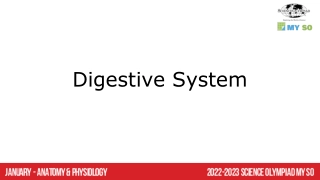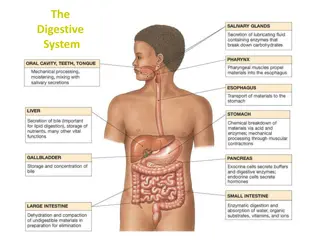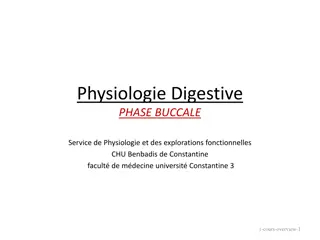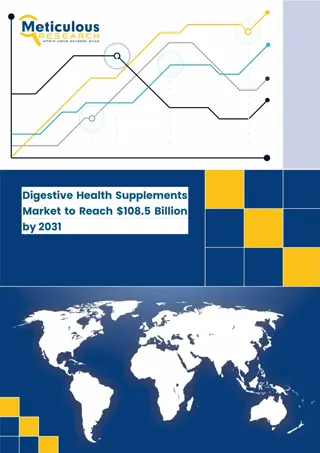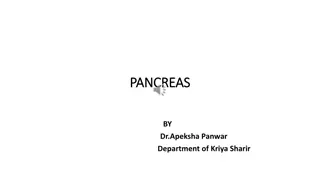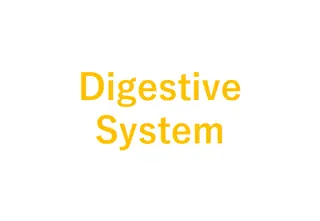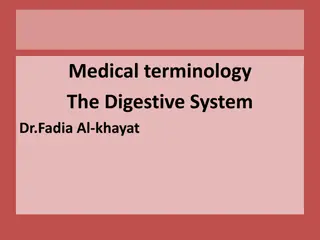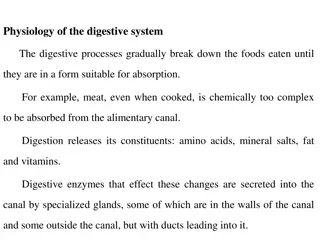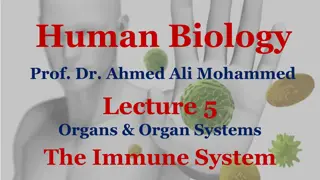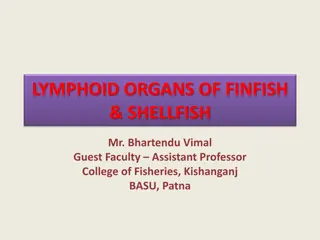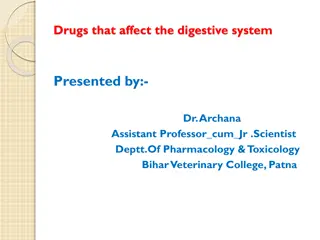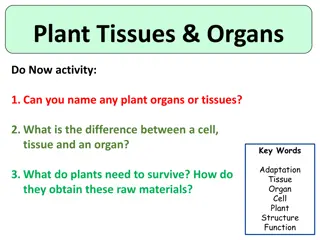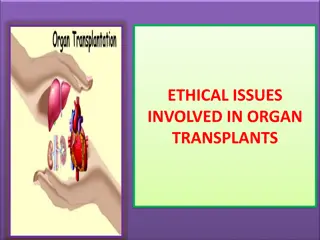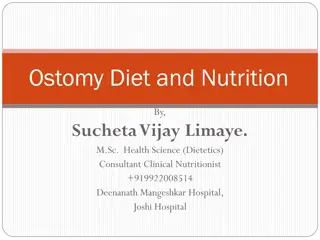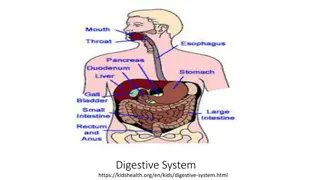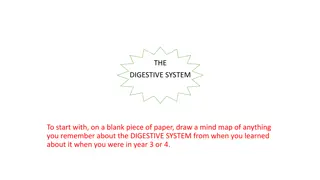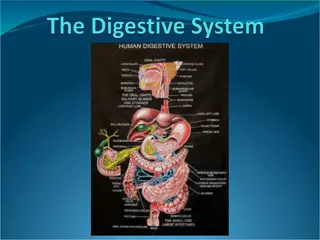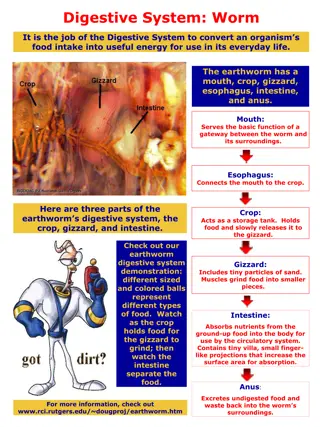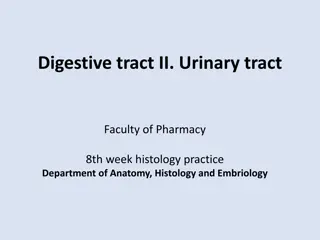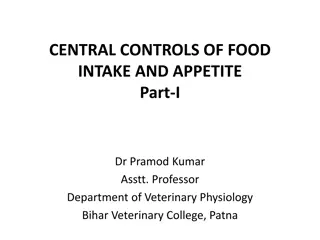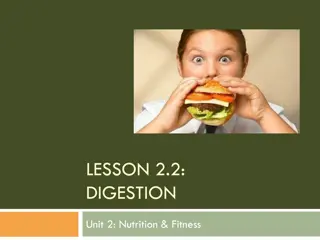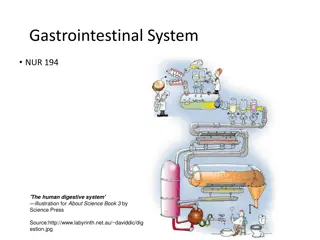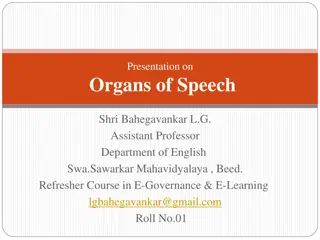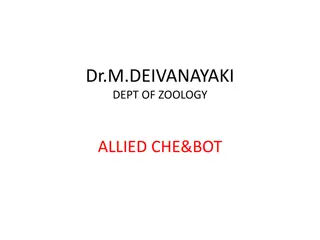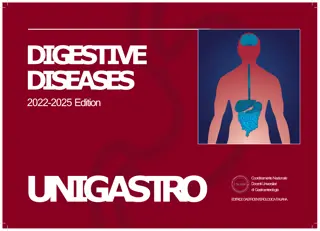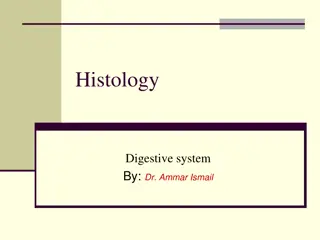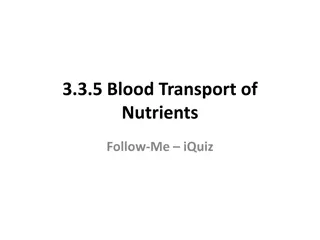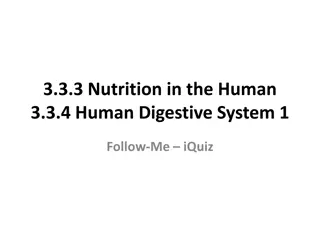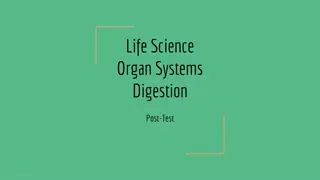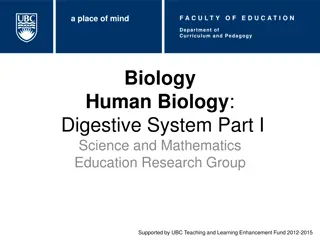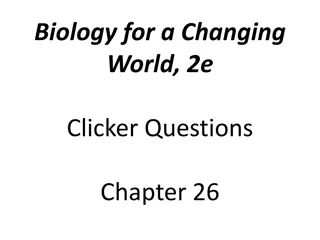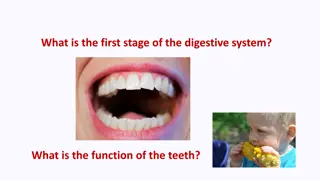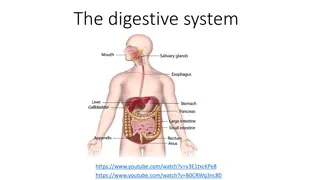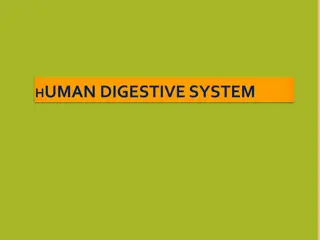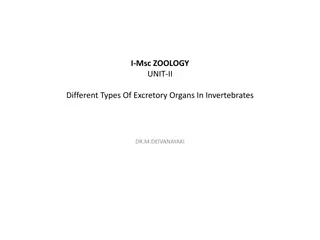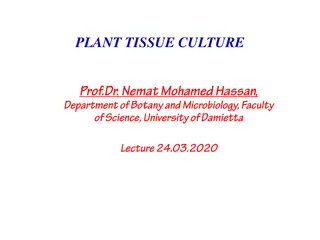Digestive System
Learn about the digestive system's organs and functions in turning food into nutrients for energy and growth. Explore the mouth, throat, esophagus, stomach, and small intestine processes. Discover mechanical and chemical digestion examples.
6 views • 13 slides
Should We Allow a Market for Transplant Organs?
Analyzing the dilemma of organ shortages in the US, this content explores the ethical dimensions of creating a market for transplant organs. Through discussions on economics, ethics, and decision-making processes in allocating scarce organs, it delves into the complexities of determining who should
0 views • 22 slides
Understanding the Digestive System Processes
The digestive system is responsible for the breakdown, absorption, and elimination of food. It involves processes such as ingestion, propulsion, mechanical and chemical digestion, absorption, and defecation. Starting from the mouth with salivary glands and oral cavity, it progresses through the esop
2 views • 38 slides
Physiologie Digestive PHASE BUCCALE
Digestive physiology involves the breakdown of food into simple nutrients for absorption by the body. It includes mechanical and chemical means of food degradation using enzymes from salivary, gastric, pancreatic, and colonic bacteria. The digestive system comprises the mouth, esophagus, stomach, li
4 views • 25 slides
Digestive Health Supplements Market - Global Opportunity Analysis
Digestive Health Supplements Market, Digestive Health Supplements, Gut Health Supplements, Prebiotics, Probiotics, Enzymes, Digestive Supplements\n
5 views • 3 slides
Comprehensive Overview of Pancreas Function and Structure
Pancreas is a vital organ in the abdomen with dual exocrine and endocrine functions. As an exocrine organ, it secretes digestive enzymes and bicarbonates into the duodenum for food breakdown. In its endocrine role, the pancreas regulates blood sugar levels by secreting insulin, glucagon, somatostati
1 views • 16 slides
Understanding the Digestive System: Essential Vocabulary and Concepts
Dive into the intricate workings of the digestive system with this comprehensive collection of essential vocabulary. Explore key terms such as absorb, acid, anus, bacteria, bile, and more to enhance your knowledge and understanding. Engage in hands-on activities and visual aids to reinforce learning
0 views • 23 slides
Understanding the Digestive System: Medical Terminology Overview
The digestive system, comprising the gastrointestinal tract (GIT) and accessory organs, plays a vital role in digestion. From the upper GI tract (oral cavity, esophagus, stomach) to the lower GI tract (small and large intestines), each part has specific functions. Understanding salivary glands and c
0 views • 18 slides
Overview of Digestive System Physiology and Functions
The digestive system functions to break down food into absorbable forms through processes like ingestion, propulsion, digestion, absorption, and elimination. Specific organs and enzymes play key roles in these processes, ultimately providing nutrients for the synthesis of body constituents and energ
0 views • 13 slides
Understanding the Immune System: Organs, Functions, and Importance
The immune system acts as a defense mechanism against pathogens and infections, comprising various organs, such as the bone marrow, thymus, spleen, white blood cells, antibodies, complement system, and the lymphatic system. It works to recognize and destroy harmful microbes, maintaining the body's h
1 views • 23 slides
Overview of Lymphoid Organs in Finfish and Shellfish
Lymphoid organs play a crucial role in the defense mechanisms of finfish and shellfish by generating immune cells. Different types of fish vary in their lymphoid organ structures, with jawless fish relying on lymphoid tissue within other organs for immune cell production. Cyclostomes, like hagfish a
1 views • 24 slides
Drugs Affecting the Digestive System and Their Functions
This presentation by Dr. Archana covers various drugs that impact the digestive system, such as antacids, intestinal astringents, antiemetics, and more. It explores the functions of these drugs and their roles in treating stomach-related issues like gastritis and peptic ulcers. The chapter discusses
0 views • 20 slides
Plant Tissues and Organs: Understanding the Structure and Function
Explore the world of plant tissues and organs, learn about their functions, differences between cells, tissues, and organs, and discover how plants survive and obtain essential raw materials for growth. Dive into the roles of leaves, stems, and roots in plant physiology, and enhance your understandi
1 views • 14 slides
Ethical Issues in Organ Transplants
Organ transplantation involves the moving of organs from one body to another to replace damaged or absent organs. The process includes cadaveric and living organ donations, with various transplantable organs like lungs, kidneys, heart, and more. There are ethical issues surrounding organ donation de
0 views • 16 slides
Understanding the Digestive System of Ruminant Animals
Ruminant animals have a unique digestive system that allows them to efficiently digest cellulose. Their stomach consists of four chambers, each serving a specific function in the digestion process. The breakdown of cellulose by microbes in the rumen produces glucose, which provides energy for the an
0 views • 22 slides
Ostomy Diet and Nutrition Guidelines for Improved Digestive Health
Learn about the role of diet and nutrition in managing digestive health post-ostomy surgery. Clinical Dietitian Sucheta Vijay Limaye provides essential tips on low-roughage diets, managing short bowel syndrome, and meeting energy and protein requirements. Follow expert recommendations for optimal nu
1 views • 21 slides
Entamoeba histolytica: Protozoan Parasite in Digestive Tract
Entamoeba histolytica is a zoonotic protozoan parasite found in the digestive tracts of various hosts. It exists in trophozoite and cyst forms, with trophozoites containing erythrocytes and pseudopodia. The cyst stage is characterized by spherical masses discharged by trophozoites and containing chr
0 views • 17 slides
Exploring the Intricacies of the Digestive System
The digestive system plays a crucial role in converting food into nutrients and eliminating waste from the body. It involves a complex network of organs such as the mouth, stomach, intestines, liver, pancreas, and gallbladder. Discover interesting facts and details about the digestive system, includ
0 views • 18 slides
Understanding the Human Body: Digestive and Circulatory Systems Exploration
Explore the fascinating world of the digestive and circulatory systems through mind mapping, definitions, blood smoothie recipes, and interactive activities. Enhance your knowledge with useful vocabulary and engaging content designed to deepen your understanding of how these vital systems function.
0 views • 15 slides
Understanding the Human Digestive System: A Comprehensive Overview
The digestive system plays a vital role in breaking down food into nutrients for absorption. This process involves stages like ingestion, digestion, absorption, and egestion. Beginning with the mouth, food moves through the esophagus, stomach, and small intestine for digestion and absorption of nutr
0 views • 21 slides
The Digestive System of Worms: Functions and Structure
The digestive system of a worm plays a crucial role in converting its food intake into energy. It consists of various parts such as the mouth, crop, gizzard, esophagus, intestine, and anus. The mouth serves as the entry point for food intake, leading to further digestion through the other components
0 views • 9 slides
Histology Overview of Digestive and Urinary Tracts in Pharmacy Practice
This histology practice session delves into the intricate details of the digestive and urinary tracts studied in the 8th week of Pharmacy school. Explore images showcasing the structures of the colon, vermiform appendix, liver, pancreas, and nephron. Gain insights into the histological features of t
0 views • 19 slides
Understanding the Central Controls of Food Intake and Appetite in Animals
Nutrition is essential for animal health and growth, with food nutrients being the main energy source through digestion and absorption processes. The regulation of animal nutrition involves various tissues and organs. Animals acquire nutrients through specialized digestive systems, breaking down foo
0 views • 14 slides
Understanding Digestion: A Journey Through the Digestive System
Dive into the fascinating world of digestion with a focus on the organs involved, processes like chewing and absorption, and the role of nutrients. Explore the journey of a pretzel through the digestive system and learn about key concepts such as the functions of the mouth, pharynx, esophagus, stoma
0 views • 12 slides
Understanding the Human Digestive System
The human digestive system is a complex pathway that starts from the mouth and ends at the anus, involving various organs like the mouth, pharynx, esophagus, and stomach. Each part plays a crucial role in breaking down food particles, absorbing nutrients, and eliminating waste products. From chewing
0 views • 132 slides
Understanding the Organs of Speech: An Insightful Presentation
Delve into the fascinating world of organs of speech with this comprehensive presentation by Assistant Professor Shri Bahegavankar L.G. Learn about the respiratory system, phonatory system, and articulatory system, exploring the functions of the lungs, muscles of the chest, windpipe, larynx, and voc
0 views • 29 slides
The Unique Digestive System and Respiratory Adaptations of Sharks
Sharks have a distinct digestive system with little physical digestion in the mouth, strong stomach acids in their U-shaped stomachs, and a spiral valve in the intestines. Their respiratory system involves gills that extract oxygen from water through ram jet ventilation. Understanding these speciali
0 views • 10 slides
UNIGASTRO Digestive Diseases 2022-2025 Edition: Comprehensive Guide by National Academic Committee in Gastroenterology
Discover the latest edition of "UNIGASTRO Digestive Diseases 2022-2025," a comprehensive textbook focusing on gastroenterology. With 51 chapters covering a range of topics from nutrition to emergencies, this edition provides essential knowledge for students transitioning to clinical practice. The bo
0 views • 7 slides
Understanding Cystic Fibrosis: Causes, Symptoms, and Treatment Options
Cystic Fibrosis (CF) is a genetic condition affecting around 11,000 people in the UK. It disrupts salt and water movement in cells, leading to thicker, stickier mucus in the body. This condition can affect the lungs, digestive system, and pancreas, with symptoms such as chronic cough, digestive issu
0 views • 23 slides
Histological Structure of Digestive System in Domestic Animals
The histology of the digestive system in domestic animals, specifically focusing on the teeth and their structures, including short (brachydont) and long (hypsodont) types. Details include the composition of enamel, dentine, cementum, and dental pulp, highlighting the differences in tooth morphology
0 views • 14 slides
Understanding Nutrient Absorption in the Digestive System
This content provides a quiz format to test knowledge on the transport of nutrients in blood, digestive processes, and functions of organs such as the liver and gallbladder. Topics covered include nutrient absorption in the small intestine, enzyme production, emulsification of fats, and more. It als
0 views • 50 slides
Understanding Nutrition and the Human Digestive System
This quiz tests your knowledge on nutrition in the human body and the digestive system. It covers topics such as omnivores, absorption processes, enzymes, and the functions of various organs like the pancreas and intestines. Explore these concepts to enhance your understanding of how food is process
0 views • 50 slides
Digestive System: Post-Test Questions and Answers
Explore this post-test quiz to assess your knowledge of the digestive system. Test your understanding of the system's functions, organization, vomiting mechanism, interactions with other systems, and the role of bacteria in digestive health. Sharpen your knowledge with insightful questions and engag
0 views • 6 slides
Understanding the Human Digestive System: Physical and Chemical Processes Explored
Explore the intricate workings of the human digestive system, focusing on both physical and chemical digestion processes. Learn about the structures involved, such as the mouth, stomach, and small intestine, and their roles in breaking down food for absorption. Discover how organs like the liver and
0 views • 13 slides
Digestive System Clicker Questions
Explore interactive clicker questions related to the human digestive system, covering topics such as bariatric surgery, accessory organs, food passage, macromolecule breakdown, stomach functions, enzyme action, nutrient absorption, and gastric bypass surgery.
0 views • 13 slides
Journey Through the Digestive System: From Mouth to Intestines
Explore the stages of the digestive system beginning with the first stage in the mouth where digestion starts with the help of teeth. Learn about the movement of food through the esophagus, breakdown in the stomach, and absorption in the small intestine. Discover the role of peristalsis in moving fo
0 views • 9 slides
Understanding the Digestive System and Its Processes
The digestive system plays a crucial role in breaking down food into nutrients for energy and growth. It involves various organs like the mouth, esophagus, stomach, small intestine, and large intestine, each with specific functions. Food moves through the digestive tract via mechanical and chemical
0 views • 18 slides
Exploring the Human Digestive System: Major Organs and Functions
The human digestive system is a complex network of organs working together to break down food into smaller molecules for absorption. It consists of major organs like the mouth, esophagus, stomach, small intestine, and large intestine, along with accessory organs such as the liver, gallbladder, and p
0 views • 34 slides
Overview of Different Excretory Organs in Invertebrates
In invertebrates, there are various types of excretory organs such as the contractile vacuole, nephridium, renal gland, coxal gland, and Malpighian tubule. These organs play crucial roles in osmotic regulation and nitrogen excretion. Different phyla exhibit diverse excretory structures like nephridi
0 views • 6 slides
Understanding Plant Tissue Culture and Regeneration Pathways
Plant tissue culture techniques such as Organogenesis and Somatic Embryogenesis play a crucial role in regenerating whole plants from meristem cells. The process involves the formation of organs directly from explants or callus structures and the production of adventitious organs like roots, shoots,
1 views • 34 slides
